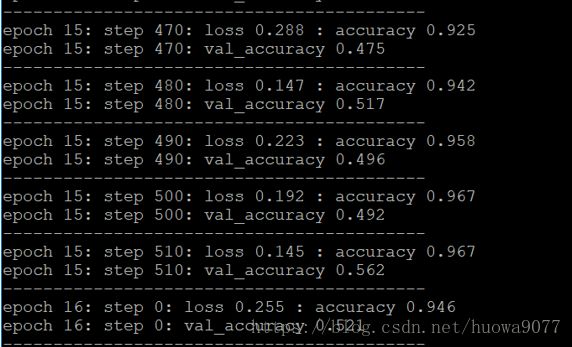tensorflow 踩坑记之batch_norm
近日在跑densenet,发现训练集和测试集的准确率相差甚远:
须知这是个二分类问题,晕........
再三检查代码,甚至将刚训练过的数据再喂进去跑,准确率竟然很低,至此检查到training_flag的问题,将问题锁定到batch_norm函数上! 罪魁祸首:tf.contrib.layers.batch_norm!!!
因为batch_norm 在test的时候,用的是固定的mean和var, 而这个固定的mean和var是通过训练过程中对mean和var进行移动平均得到的。而直接使用train_op会使得模型没有计算mean和var,因此正确的方式是:
每次训练时应当更新一下moving_mean和moving_var
解决:将batch_normalization替换成如下函数:
def bn_layer(x, scope, is_training, epsilon=0.001, decay=0.99, reuse=None):
"""
Performs a batch normalization layer
Args:
x: input tensor
scope: scope name
is_training: python boolean value
epsilon: the variance epsilon - a small float number to avoid dividing by 0
decay: the moving average decay
Returns:
The ops of a batch normalization layer
"""
with tf.variable_scope(scope, reuse=reuse):
shape = x.get_shape().as_list()
# gamma: a trainable scale factor
gamma = tf.get_variable("gamma", shape[-1], initializer=tf.constant_initializer(1.0), trainable=True)
# beta: a trainable shift value
beta = tf.get_variable("beta", shape[-1], initializer=tf.constant_initializer(0.0), trainable=True)
moving_avg = tf.get_variable("moving_avg", shape[-1], initializer=tf.constant_initializer(0.0), trainable=False)
moving_var = tf.get_variable("moving_var", shape[-1], initializer=tf.constant_initializer(1.0), trainable=False)
if is_training:
# tf.nn.moments == Calculate the mean and the variance of the tensor x
avg, var = tf.nn.moments(x, np.arange(len(shape)-1), keep_dims=True)
avg=tf.reshape(avg, [avg.shape.as_list()[-1]])
var=tf.reshape(var, [var.shape.as_list()[-1]])
#update_moving_avg = moving_averages.assign_moving_average(moving_avg, avg, decay)
update_moving_avg=tf.assign(moving_avg, moving_avg*decay+avg*(1-decay))
#update_moving_var = moving_averages.assign_moving_average(moving_var, var, decay)
update_moving_var=tf.assign(moving_var, moving_var*decay+var*(1-decay))
control_inputs = [update_moving_avg, update_moving_var]
else:
avg = moving_avg
var = moving_var
control_inputs = []
with tf.control_dependencies(control_inputs):
output = tf.nn.batch_normalization(x, avg, var, offset=beta, scale=gamma, variance_epsilon=epsilon)
return output
def bn_layer_top(x, scope, is_training, epsilon=0.001, decay=0.99):
"""
Returns a batch normalization layer that automatically switch between train and test phases based on the
tensor is_training
Args:
x: input tensor
scope: scope name
is_training: boolean tensor or variable
epsilon: epsilon parameter - see batch_norm_layer
decay: epsilon parameter - see batch_norm_layer
Returns:
The correct batch normalization layer based on the value of is_training
"""
#assert isinstance(is_training, (ops.Tensor, variables.Variable)) and is_training.dtype == tf.bool
return tf.cond(
is_training,
lambda: bn_layer(x=x, scope=scope, epsilon=epsilon, decay=decay, is_training=True, reuse=None),
lambda: bn_layer(x=x, scope=scope, epsilon=epsilon, decay=decay, is_training=False, reuse=True),
)参考:https://blog.csdn.net/jiruiYang/article/details/77202674
https://github.com/tensorflow/tensorflow/issues/1122#issuecomment-280325584
